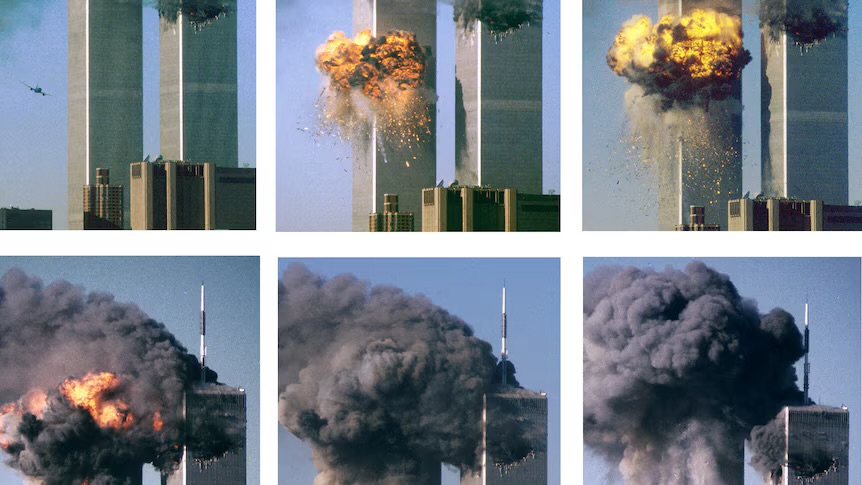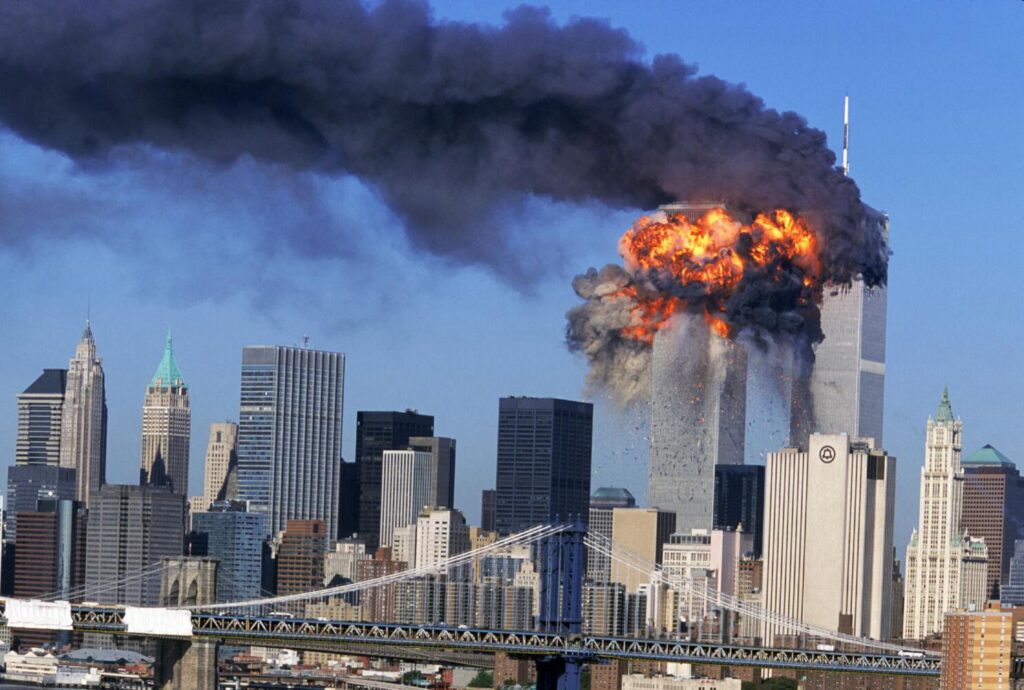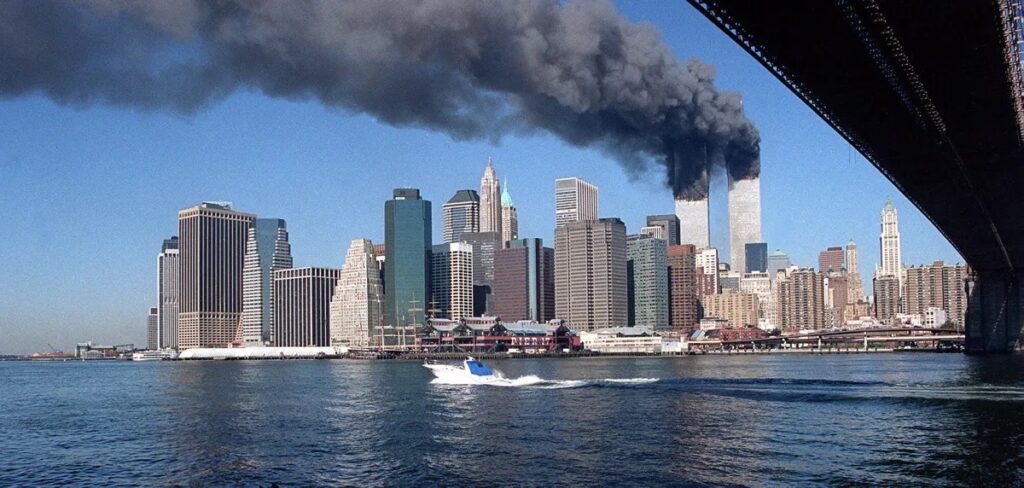
September 11, 2001, began like any other day in the United States. But within hours, it became one of the darkest days in modern history. Commonly referred to as 9/11, the attacks that occurred on that morning changed the world forever. Nearly 3,000 people were killed, thousands more were injured, and the emotional, political, and global aftermath still echoes today—more than two decades later.
What Happened on 9/11?
On the morning of September 11, 2001, 19 terrorists associated with the extremist group al-Qaeda hijacked four commercial airplanes. Their plan was terrifyingly simple but devastatingly effective: use the planes as weapons to strike symbolic targets across the United States.
American Airlines Flight 11 crashed into the North Tower of the World Trade Center in New York City at 8:46 a.m. United Airlines Flight 175 struck the South Tower at 9:03 a.m. American Airlines Flight 77 hit the Pentagon, the headquarters of the U.S. Department of Defense, at 9:37 a.m. United Airlines Flight 93 never reached its target. Passengers heroically fought back, and the plane crashed in a field in Shanksville, Pennsylvania, at 10:03 a.m. It’s believed this flight was headed for the White House or the U.S. Capitol.
The Twin Towers collapsed within hours of being struck, taking thousands of lives with them and sending clouds of ash and debris across lower Manhattan.
Who Was Responsible?
The attacks were carried out by al-Qaeda, an Islamic extremist group founded by Osama bin Laden. Their stated goal was to retaliate against what they viewed as U.S. interference in the Middle East, particularly the stationing of U.S. troops in Saudi Arabia, the Israeli-Palestinian conflict, and U.S. policies that they perceived as hostile toward Islam.
Al-Qaeda operated with a complex network of sleeper cells and international supporters. The hijackers had lived and trained in the U.S. for months before the attacks, blending in while preparing for their deadly mission.

Immediate Aftermath
The U.S. response was swift. On the same day, President George W. Bush addressed the nation, calling the attacks “acts of terror” and promising justice. Airports across the country were shut down for days. Military readiness was raised, and first responders rushed to Ground Zero, risking their lives in the search for survivors.
A few weeks later, on October 7, 2001, the U.S. launched Operation Enduring Freedom in Afghanistan to dismantle al-Qaeda and remove the Taliban regime that had provided them sanctuary. This marked the beginning of the War on Terror, a global military campaign that would last for decades and influence international relations and domestic policies worldwide.
The Human Toll
Nearly 3,000 people from over 90 countries died in the attacks. Among them were:
Firefighters, police officers, and EMTs who ran into burning buildings to save lives. Office workers, passengers, and airline crew members. Ordinary people who became heroes in the sky, like those on Flight 93.
Beyond the immediate death toll, over 6,000 people were injured, and many more suffered long-term health effects. In the years since, thousands of first responders and survivors developed chronic illnesses—including cancers and respiratory diseases—due to prolonged exposure to toxic debris at Ground Zero.
A Nation Transformed
9/11 had a profound effect on American society and culture:
Security: The Transportation Security Administration (TSA) was created, and airport security underwent a complete overhaul. New policies included stricter screening, no-fly lists, and the use of full-body scanners. Surveillance: The Patriot Act expanded government powers to monitor communications in an effort to prevent terrorism, raising long-standing debates over privacy and civil liberties. Immigration: Border and visa policies became more stringent, and Muslims and people of Middle Eastern descent faced increased scrutiny and discrimination. Patriotism: There was a surge in national unity and patriotism, symbolized by the American flag, which became a widespread emblem of resilience and strength.

The Global Impact
The global effects of 9/11 were far-reaching. NATO invoked Article 5—the principle of collective defense—for the first time in its history, declaring the attacks on the U.S. as attacks on all member nations.
The War on Terror expanded beyond Afghanistan. In 2003, the U.S. invaded Iraq, citing weapons of mass destruction and alleged links between Saddam Hussein and terrorist organizations. Though these claims were later widely discredited, the war led to long-term instability in the region and contributed to the rise of extremist groups like ISIS.
Justice and the Hunt for Bin Laden
For nearly a decade after the attacks, Osama bin Laden remained at large. On May 2, 2011, a U.S. Navy SEAL team located and killed him in Abbottabad, Pakistan, during a covert operation ordered by President Barack Obama. His death was seen as a major victory, but it did not mark the end of al-Qaeda or global terrorism.
Memorials and Remembrance
To honor the victims and ensure that the events of 9/11 are never forgotten, several memorials have been established:
The National September 11 Memorial & Museum in New York City stands where the Twin Towers once were. Its reflecting pools and exhibits honor the lives lost. The Pentagon Memorial commemorates those killed in Washington, D.C. The Flight 93 National Memorial in Pennsylvania honors the courage of those passengers who sacrificed themselves to save others.
Every year, on September 11, moments of silence are observed across the country, and the names of the victims are read aloud in somber ceremonies.
A Legacy Still Unfolding
The legacy of 9/11 is still being written. It changed how nations fight terrorism, reshaped international diplomacy, and left a lasting psychological mark on millions. The wars it sparked continue to influence global politics, and the questions it raised about freedom, safety, and justice still challenge us today.
While America has rebuilt and recovered in many ways, the trauma and memory of that day remain. For those who lived through it, 9/11 is not just a historical event—it is a personal and national wound that continues to heal.
Summary
September 11, 2001, is remembered not just as a day of unimaginable tragedy but also as a pivotal turning point in modern history. The attacks reshaped the world in every sphere—from geopolitics and military strategies to security, civil rights, and global alliances. The heroism, loss, and unity of that day continue to define our understanding of courage and resilience.
